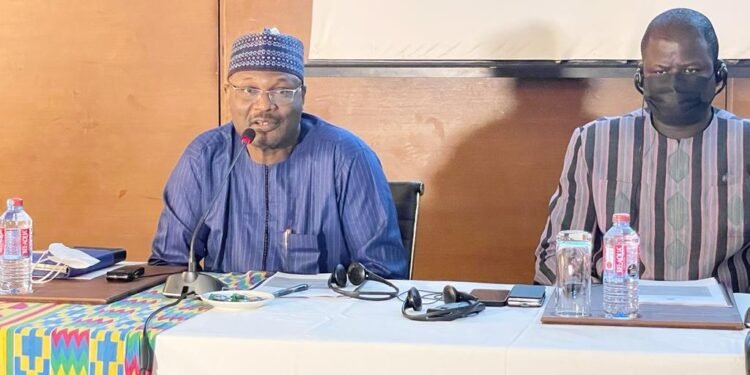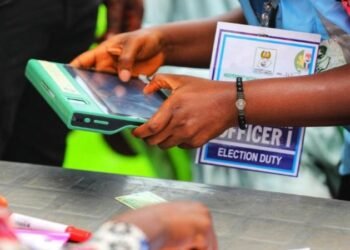By Emmanuel Oloniruha
The Independent National Electoral Commission (INEC) says its has implemented many of the 178 recommendations made by accredited domestic and international observers on the 2019 general elections.
INEC Chairman, Prof. Mahmood Yakubu disclosed this at the commission’s meeting with the European Union (EU) Election Observation Follow-up Mission, led by the Head of EU Observation Mission, Mrs Maria Arena, in Abuja on Tuesday.
Yakubu said that immediately after the 2019 general election, INEC undertook a comprehensive review of the election observation reports by accredited domestic and international observers.
He said beyond that, INEC conducted its own internal review involving the commission’s regular and ad hoc officials and subsequently expanded it to include political parties, civil society organisations, security agencies and media organisations.
“From the review, we identified 178 recommendations. We then categorised them into three areas for the purpose of implementation.
“We have gone ahead to implement many of the recommendations that require administrative action by the commission, while working with the National Assembly on areas that require legislative action by way of amendments to the Electoral Act and the constitution,” Yakubu said.
He disclosed that with regard to the 2019 general election, the EU Observation Mission made 30 recommendations out of which 11 concerned the electoral commission directly.
He noted that three of them were identified as priority recommendations while 8 were categorised as general.
Yakubu said that priority recommendations included the improvement of organisational and operational capacity of the commission as well as the management of election outcome, particularly the availability and public access to results from polling units and collation centres.
“ Since 2019, we have made progress, including the creation of a new Gender and Inclusivity Department, as well as the Litigation and Prosecution Department.
“We have similarly expanded voter access to polling units for the first time in 25 years by converting the erstwhile 56,872 Voting Points and Voting Point (Settlements) into polling units and relocation of some of them from congested locations to unserved and under-served locations, bringing the total number of polling units to 176,846.
“We must admit that in many states. we are struggling to achieve a more balanced distribution of voters to polling units.
“However, this is a priority project for the commission which will be accomplished before the 2023 general elections.”
Yakubu said the biggest progress made by the commission since 2019 was in the area of deepening the deployment of technology in elections.
“INEC is the first electoral commission in West Africa, if not Africa as a whole, to upload polling unit level results to a portal in real-time on election day.
“In addition, there are other portals for ease of nomination of candidates and submission of list of polling agents by political parties and the accreditation of media, domestic and international observers.”
The INEC chairman said that INEC had also made a huge progress in the area of voter accreditation through the deployment of the Bimodal Voter Accreditation System (BVAS).
“We have carried out a number of pilots and in spite of the challenges encountered in some locations, we are convinced about its efficacy.
“In the six by-elections conducted last weekend in four states of the federation, the device performed optimally in both rural, sub-urban and urban areas where the elections were held.
“We will continue to carry out more pilot test of the BVAS and deploy the same device in the forthcoming Ekiti and Osun governorship elections and ultimately the 2023 general elections.”
Yakubu said that INEC would continue to improve on elections in Nigeria and transparent in the management of the process, adding that Nigeria would always welcome suggestions for improvement by Nigerians as well as friends of Nigeria.
Earlier in her remarks, Arena, said the purpose of the mission was to assess how recommendations made on the 2019 general elections had been implemented.
“As you know we have had recommendations after the 2019 general elections. The purpose of this follow up mission is to asses the way the country has taken onboard these recommendations.”
She commended INEC for working with relevant stakeholders to achieve the new Electoral Act, expressing confidence that it would make important difference on the next election in 2023.
“This is really important for us to see also the way INEC contributes to this electoral Act. Also you did work with important stakeholders like the Civil Society Organisations on these changes.”
The head of the EU Follow Up Mission while commending INEC on the new Act, said having the new Electoral Act was good but the implementation was more important.
Arena said that EU as long time standing partner of Nigeria would continue to advise and support INEC to strengthen the country’s democracy.
“The EU has recently launched its new electoral support programme in view of the next elections.
“We are very happy and proud to have the possibility to continue to work with you, supporting you and to contribute to improving the electoral process and system in Nigeria.
“This is the interest to strengthen Nigeria’s democracy and in the interest of the people,” Arena said.
She was accompanied by the EU Ambassador to Nigeria, Samuela Isopi and others.
(NAN)










